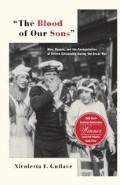Abstract
In Alfred Noyes’s 1915 recruiting play Rada, the wife of a Belgian doctor and her twelve-year-old daughter are captives in their own home at the mercy of two German soldiers. Most of the drama s action is designed to reveal the brutality of the Germans, whose merriment includes forcing an old vicar and his cook to “dance naked round the dead body of his wife” and hanging a revolver rom the Christmas tree.1 In the final climactic scene of the play the German soldiers are ordered to hand Rada and her daughter over to be gang raped. Contemptuously Rada cries: “And war, they tell me, is a noble thing. It is the mother of heroic deeds, the nurse of honour, manhood.”2 Rather than allow her daughter to be ravished by the Germans, she locks herself and her child in the bedroom. The scene culminates with young Bettine, the innocent daughter, crying: “O British! British Come! Come Quickly, British!” as the Germans try to break down the bedroom door. The play ends when Rada shoots her daughter and herself to save them both from what is literally depicted as a fate worse than death. The British finally arrive, moments too late.3
Preview
Unable to display preview. Download preview PDF.
Notes
Alfred Noyes, Rada: a Belgian Christmas Eve (London: Methuen & Co., 1915), p. 17.
For an excellent introduction to the recent literature on masculinity, see Joanna Bourke, Dismembering the Male: Mens Bodies, Britain and the Great War (Chicago: University of Chicago Press, 1996), pp. 11–30.
Nancy K. Bristow, Making Men Moral: Social Engineering During the Great War (New York: New York University Press, 1996), pp. 4–53.
The original use of the name “Tommy Atkins” for the ideal-typical British soldier is not entirely clear. Robert Graves claims that the original Tommy Atkins was a Royal Welch Fusilier who fought in the War of American Independence while others have suggested that “Tommy Atkins” was the name used on sample enlistment forms by Wellington s army. John Laffin, Tommy Atkins: The Story of an English Soldier (London: Cassell, 1966), pp. xi–xiii
Irving Howe, ed., The Portable Kipling (New York: Penguin, 1982), pp. 613–615
Robert Graves, Good-Bye to All That (NewYork: Doubleday, 1957), p. 83
R.J. Adams and Philip Poirier, The Conscription Controversy in Great Britain, 1900–1918 (Columbus: Ohio State University Press, 1987), p. 3.
Dr. Alexander Irvine, God and Tommy Atkins (London: Hutchinson, 1918), p. 125.
John Osborne, The Voluntary Recruiting Movement in Britain (Ann Arbor: University Microfilms International, 1983), p. 2.
John W. Graham, M.A., Conscription and Conscience: A History 1916–1919 (London: George Allen and Unwin, 1922), p. 30.
Quoted in Paul Fussell, The Great War and Modern Memory (Oxford: Oxford University Press, 1977), p. 301.
Quoted in Lynn Layton, “Vera Brittains Testament(s)” in Margaret Higonnet et al., eds., Behind the Lines: Gender and the Two World Wars (New Haven: Yale University Press, 1987), p. 74.
J. H. Balfour Browne, War Problems (London: Longmans, Green &c Co., 1915), p. 88.
See Susan Kingsley Kent, Making Peace: The Reconstruction of Gender in Interwar Britain (Princeton: Princeton University Press, 1993), pp. 41–42.
Samuel Hynes, A War Imagined: The First World War and English Culture (London: Pimlico, 1992), pp. 223–224.
Have-lock Ellis, Psychology of Sex: A Manualfor Students (New York: Ray Long and Richard R. Smith, Inc., 1933).
Robert Graves, Goodbye to All That (New York: Doubleday [1929], 1957); Hynes, p. 225.
Marilyn Shevin-Coetzee and Franz Coetzee, eds., World War I and European Society: A Sourcebook (Lexington, MA: D. C. Heath, 1995), p. 181.
Philip Hoare, Oscar Wilde’s Last Stand: Decadence, Conspiracy, and the Most Outrageous Trial of the Century (New York: Arcade Publishing, 1997).
For fascinating discussions of gender role reversal, see Sandra Gilbert, “Soldier’s Heart: Literary Men, Literary Women and the Great War,” in Margaret Higonnet, et al., eds., Behind the Lines: Gender and the Two World Wars (New Haven: Yale University Press, 1987), p. 223.
J. H. Morgan, German Atrocities: An Official Investigation 2nd ed. (London: T. Fisher Unwin, 1916), pp. 136.
C. Sheridan Jones, The Unspeakable Prussian (London: Cassell & Co. Ltd, 1914), p. 53.
Jessie Pope, More War Poems (London: Grant Richards Ltd., 1915), pp. 42–43.
For a discussion of several of these policies, see Arthur Marwick, The Deluge: British Society and the First World War (New York: Norton &c Co., 1965), pp. 56–68.
F. E. Smith, “Preface,” in Arthur Conan Doyle, To Arms! (London: Hod-der and Stoughton, 1914), p. 10.
John Ferns, Lytton Strachey (Boston: Twayne Publishers, 1988), p. 15.
Copyright information
© 2002 Nicoletta F. Gullace
About this chapter
Cite this chapter
Gullace, N.F. (2002). The Making of Tommy Atkins. In: “The Blood of Our Sons”. Palgrave Macmillan, New York. https://doi.org/10.1007/978-1-137-04751-9_3
Download citation
DOI: https://doi.org/10.1007/978-1-137-04751-9_3
Publisher Name: Palgrave Macmillan, New York
Print ISBN: 978-1-4039-6710-7
Online ISBN: 978-1-137-04751-9
eBook Packages: Palgrave History CollectionHistory (R0)

